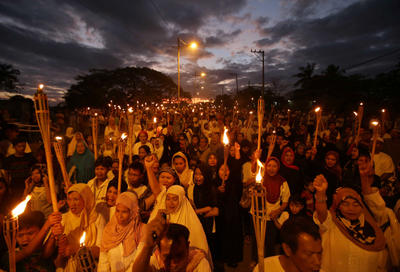Author: Kevin H.R. Villanueva, University of Leeds
Amid the spiralling chaos in Lahad Datu, Sabah, a crucial question has been put forth which no one has yet explored: what can ASEAN do?
The answer is, put plainly and simply, nothing.
The 2008 ASEAN Charter effectively gave the regional bloc legal personality and provided its members with the rules under which they can ‘resolve peacefully all disputes in a timely manner through dialogue, consultation and negotiation’. It is essential to note, however, that in the event of a crisis it is the member states themselves that must be parties to the dispute. Yet the conflict before us today is ostensibly between Malaysia (a state) and Sultan Jamalul Kiram III of Sulu (a legal person). The former has effective sovereign control over a territory whose ownership is claimed by the latter.
ASEAN is an intergovernmental organisation. In the actual event of conflict, it is also the member states which must agree to a resolution. And here there is another problem: any settlement will have to be left to the good intentions of the parties — ASEAN has no institutional device for enforcing decisions. If the articles on the settlement of disputes between ASEAN member states are half-baked, the institutional resolution of clashes between the distinct entities outlined above will still be a long time coming.
Do the present circumstances, however, exonerate ASEAN from any duty or action on the escalating conflict? No. There is another way to phrase the initial question: what can the member states do for ASEAN?
There are three factors for the leaders to ponder. First, Sultan Kiram has deployed his small but loyal following to reclaim what they hold to be their ancestral homeland. The move is charged with profound symbolism and will reverberate long into history, especially when lives have already been sacrificed. The sultan has himself admitted: ‘I am the poorest sultan in the world’. This declaration is not just about fair economic compensation but an appeal to clarify what his title can win for him and his people in the context of present geopolitical realities.
Secondly, Sabah is the second-largest federal state of Malaysia after Sarawak. It is home to rare fauna and flora, tracts of timberland and palm oil plantations — but it is also one of the poorest regions in Malaysia. This is why it made sense for President Fidel Ramos to push for the East ASEAN Growth Area in the 1990s, so that it could spur an ‘economic corridor’ between Brunei, Indonesia, Malaysia and the Philippines. The socio-political and economic costs for Prime Minister Najib are far too high for him to run away from this crisis, tail between his legs, like his detractors might wish.
Thirdly, the Philippine claim to Sabah has not been ‘dormant’ — it has instead been erratic, subject to the vagaries of domestic and international politics. President Ferdinand Marcos dropped it, Corazon Aquino was somehow indifferent to it, Ramos pursued it economically up until the claims were overshadowed by the instability and corruption under the Estrada and Arroyo administrations. What is truly at stake for President Benigno Aquino III in all this confusion is the fate of the 800,000 Filipinos who are in Sabah, and whether they will continue to live peacefully or form an exodus to Sulu as humanitarian refugees.
ASEAN was built by states in order to keep the region stable and secure and inspire political, economic and cultural development. The problem of borders is not new — one compelling reason for the birth of ASEAN was to end the konfrontasi between Indonesia and Malaysia for the control of the island of Borneo, where Sabah incidentally also sits. If the ingredients of peace and stability are threatened, then the heirs of ASEAN have reason to be perturbed — what is there to gain if the organisation first falls short of its objectives and consequently delegitimises its benefactors? A negotiated settlement will have to be more creative to unravel the deadly snarl on the region’s footsteps.
ASEAN member states must first look to the Philippines, Malaysia and Sultan Kiram because those who are sure to stop further bloodshed are also those who stand to gain the most out of a promising future for Sabah. Creativity also requires calmness, stepping back and gaining a new vantage point. They will probably only be able to do this if they take in a fresh mediator able and willing to listen, and listen again. Brunei can be a humble, silent and confident go-between. It shares borders with Sabah (originally its own) and is knowledgeable about Islam. Brunei also happens to be the current chair of ASEAN. This may be a case of turning crisis into opportunity.
Kevin H.R. Villanueva is a University Research Scholar in East Asian Studies and Politics and International Studies at the University of Leeds. The views expressed in this article are the author’s own.
A version of this article was first published here in the Philippine Inquirer.



















